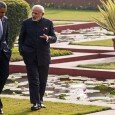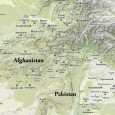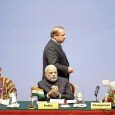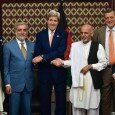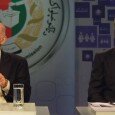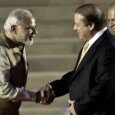By Rahimullah Yusufzai
I dream I am the president when I awake, I am the beggar of the world – Pashto couplet
This couplet or landay as it is known in Pashto, best describes the beleaguered status of the President of Afghanistan. This is how many Afghans viewed President Hamid Karzai who ruled them for more than 12 years and travelled all over the world to seek assistance and beg for money for his war-ravaged country.
It seems Afghanistan’s new president would dream and feel the same way even though he won’t publicly concede this fact. As the two leading presidential candidates, Dr Abdullah and Dr Ashraf Ghani Ahmadzai square up for the second round of polling, the focus is gradually shifting to the challenges that the new president would face when Karzai completes his second term on May 22 to make room for his successor.
Three installments of partial results of the presidential polls held on April 5 were initially announced by the Independent Election Commission (IEC), but it contributed to the uncertainty about the outcome as there was no clear winner capable of crossing the 50 percent threshold needed to win the election in the first round. Dr Ashraf Ghani even criticised the IEC for causing confusion by announcing partial results and accused it of being biased in favour of his main rival. The agonizing wait for the around seven million Afghans who braved Taliban threats, general insecurity and cold weather to cast their ballots didn’t end until April 26 when the preliminary results were made public.
The final results would be announced on May 14, but it would be more of a formality as the votes obtained by the eight presidential candidates are already known. However, the announcement of the final tally of votes polled by the candidates on May 14 would put into motion the preparations for the second round that must be held within 15 days. The run-off polls ought to be organized by May 28, though it was suggested that more time should be given to the IEC to make it happen.
The suggestion has been heeded and now the second round would take place on June 7 to give more time to the IEC to organize the polling. It would still be a challenging task for the IEC to meet the deadline as new ballot papers would be printed and transported to polling stations located in remote, mountainous areas where in some cases donkeys instead of vehicles were used for the purpose due to the absence of roads. Besides, Afghans have no experience of holding any run-off elections as Karzai had won the previous two presidential polls in 2004 and 2009 in the first round. However, IEC officials are confident that holding the second round would be relatively easy as staff and resources were readily available and USD127 million had already been allocated to meet the costs.
This was the first election the Afghans organized in which no foreign experts were involved and the outcome wasn’t bad as allegations of rigging are fewer compared to the previous elections. The Election Complaints Commission (ECC), which hears and decides petitions regarding the conduct of the elections, had the services of foreigners in the previous four elections, including two for president and two for the parliament, held after the fall of Taliban regime in 2001. This time though, both the IEC and ECC are entirely manned by the Afghans and it was a challenge for them to hold credible elections to ensure political transition from Karzai to the new president.
If all goes well, it would be the first time in Afghanistan’s history that power would be peacefully transferred to a new ruler as in the past blood was shed and rulers, whether a king or president, were forcibly removed or brutally eliminated. In 1973 King Zahir Shah was ousted from power by his cousin Sardar Mohammad Daoud in a coup d ‘etat spearheaded by military officers. Daoud was killed along with his family members in 1978 when the Afghan communists backed by air force and army officers seized power.
The communist presidents, Nur Mohammad Taraki and Hafizullah Amin, not only lost power but also their life during their internal power struggles, and Babrak Karmal was ousted to make room for Dr Najibullah. The last-named stepped down, was jailed and finally in 1996 was tortured to death by the Taliban. The fractious mujahideen rulers lost power to the Taliban, who in turn were forced out by the invading US forces with the help of the Northern Alliance in December 2001 and replaced by the pro-West Karzai government.
The field was almost tailor-made for Dr Abdullah in the first round as he was the only candidate representing the non-Pashtuns against seven contestants from the majority Pashtun ethnic group. Though Dr Abdullah claims to be half-Tajik, half-Pashtun as his mother is Tajik and his father Pashtun, most Pashtuns don’t accept him as one of their own because he is considered as successor to the Tajik warlord and former mujahideen commander Ahmad Shah Masood and has a home in the Tajik-populated Panjsher Valley.
His opponents divided the Pashtun vote among themselves and enabled Dr Abdullah to surge ahead of the pack. His tally of votes was 29,73,706, constituting 44.9 percent of the total votes. It was an improvement on his 2009 electoral performance when he polled 32 percent of the vote and lost to Karzai in the first round. On his part, Dr Abdullah has always maintained that Karzai being the president massively rigged the polls and snatched victory from him.
Dr Abdullah was helped by his choice of the Hazara cleric Mohammad Mohaqqiq, a former Shia warlord, as his second vice-president he pulled in many Hazara votes. His pick for the first vice-president was Engineer Khan Mohammad, affiliated to a breakaway faction of former mujahideen leader Gulbaddin Hekmatyar’s Hezb-i-Islami led by Abdul Hadi Arghandiwal, but he couldn’t attract many votes from his fellow Pashtuns. Dr Abdullah has become fluent in Pashto as he has been making painstaking efforts to become acceptable to the majority Pashtun ethnic group.
However, his task to do so has become tougher now that a blue-blooded Pashtun, Dr Ashraf Ghani, is his opponent in their straight contest for president. There is no doubt Dr Abdullah by getting nearly 45 percent vote has done very well and inched closer to his target of becoming the president, but he could fall by the wayside if the Pashtuns flock to Dr Ashraf Ghani as is widely believed in the final round of the polls. The Tajiks, who forms an estimated 27 percent of Afghanistan’s 32 million population, would certainly vote en block for Dr Abdullah, but the Pashtuns are more in numbers with 42 percent and could decisively tilt the balance in favour of Dr Ashraf Ghani.
Dr Ashraf Ghani polled 20,82,417 votes, which came to 31.5 percent, to emerge as the runner-up. He managed to increase his tally of votes by an impressive margin despite the presence of six other Pashtun candidates as he had secured only 3 percent of the vote in the 2009 election and was placed a distant fourth in the contest. His much improved electoral performance is attributed to his decision to adopt a more pro-people manifesto, invoking Islam to appeal to the conservative population, ensuring greater interaction with the masses by building a house in Kabul, wearing traditional Afghan dress complete with a turban on special occasions, and growing a small beard.
Unlike other candidates, Dr Ashraf Ghani didn’t pick any ethnic Tajik as his running mate and it was considered a risky proposition. His choice of the Uzbek warlord, General Abdur Rasheed Dostum, was also deemed as an anomaly because he has a clean past as an academic with PhD in anthropology, an economist with the World Bank and an efficient finance minister in Afghanistan. Dostum’s record is troublesome because he has been accused of human rights abuses as a militia commander changing sides from the communists to the mujahideen to the pro-US Karzai regime.
Though Dr Ashraf Ghani prevailed upon him to seek forgiveness from the Afghan people for his past sins, Dostum as a powerful first vice-president would cause uneasiness not only among many Afghans but also in the Western capitals. However, Dostum remains a vote-getter among the 9 percent Uzbeks in the country and this is the reason Dr Ashraf Ghani made him his running mate. His choice was the second vice-president, Sarwar Danish, is a Shia Hazara who served as a minister in the past and was picked to balance the ticket and attract Hazara voters, who also form 9 percent of the population.
The two top candidates have made it clear they aren’t interested in making a power-sharing deal to avoid the run-off election. Instead, they are gearing up for the second round by holding talks to seek support from the losing candidates, particularly with former foreign minister Dr Zalmay Rassoul who polled 11.5 percent of the vote, and the former mujahideen leader Prof Abdur Rab Rasul Sayyaf, who received 7 percent.
The run-off would increasingly become ethnic-based and could be divisive and bitter. The loser could cry foul and contest the results. This won’t augur well for Afghanistan’s nascent democracy in the post-2014 period when most of the US-led foreign forces would have departed. The Taliban too would be a factor in the second round as their attacks and threats could keep the turnout low in the Pashtun areas in the south and east and in the process harm the prospects of Dr Ashraf Ghani.
In terms of policy, there isn’t much to choose between Dr Abdullah and Dr Ashraf Ghani as they have both served as ministers in President Karzai’s government and would mostly follow the same policies. However, one major difference in their approach to Karzai is their pledge to sign the Afghan-US bilateral security agreement. They have also promised to pursue peace talks with the Taliban even though there aren’t many prospects of making it happen as long as residual US forces remain in Afghanistan at the nine military air bases under the proposed bilateral security agreement.
The writer is a senior journalist based in Peshawar






















































































